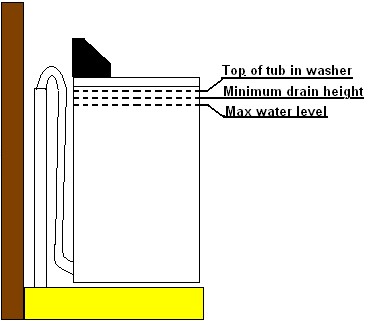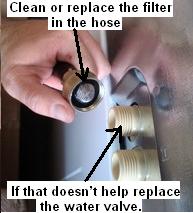Washer Repair Guide
In this washer repair guide I will walk you through the steps in repairing
common washer problems that occur with all brand washers. The steps in repairing
these problems are very similar and in some cases identical.
These common problems include washer overflowing, washer drains while filling, washer fills slowly and no water to washer.
Washer overflowing
If your washer is
overflowing, this washer repair guide can help. If your washer is overflowing it
can damage your floor and create a huge mess. Fortunately, this washer repair
guide can help. Follow these steps below and your washer will be fixed in no
time.
First off when the washer is overflowing does turning off the
washer stop the water flow?
No. If you have to cut the
water off at the wall to stop water flow, the water valve is bad and needs
replacing. Water valves can be purchased at AppliancePartsPros.com.
Yes. If cutting the washer off stops
the water flow there is something wrong with the water level control. To check
the water level control, you must locate the tube that runs from the water level
control to the bottom of the washer tub. Sometimes this hose will come loose
from the tub, if so reattach it and your problem will be fixed. If the tube is
still attached to the tub pull it off and check to see if the tube is clogged,
if so unclog it. If neither of these are your problem the water level control is
bad and needs replacing. Water level controls can be purchased at AppliancePartsPros.com.
Washer Drains During Fill
If your washer is
draining during the fill cycle this washer repair guide can help. This problem
is caused by a few things and can be repaired easily.

The top of the drainpipe to your house plumbing must be above the highest water
level in the tub. If not, the water will start draining once the water in the
tub reaches a level above the top of the drainpipe. Sometimes the drainpipe will
slip down under the house too far and you can simply pull it back up and secure
it in place. If you are unable to do that, you can extend the drainpipe using a
coupling and a short piece of pipe of the same size. Sometimes you are unable to
do this because the pipe is inside a wall, if this is the case you can try
running your drain hose from the washer up high to compensate for the low
drainpipe.
If the drain hose from your washer is pushed down in to the
drainpipe too far it will cause the same problem. To fix this simply pull the
drain hose to within six inches of the top of the drainpipe.
Another
thing that will cause this is that the water is siphoning out. The water will
siphon out if the drain hose cannot get air. The most common thing that causes
this is that someone taped the drain hose to the drainpipe so that the water
will not back out the drain during pump out. The best way to fix this is to
clean out the drainpipe so that the water drains freely enough that it doesn’t
back out and remove the tape from the drain hose. Sometimes, especially on old
houses, the drainpipe isn’t big enough to drain the water no matter how clean it
is. In this case, to fix this problem you will have to install a siphon breaker
(part number 76660) at the top of the drainpipe to allow the drain hose to
receive air and still be taped up so that the water will not back out. This part
can be purchased at AppliancePartsPros.com.
Water Enters Washer Slowly/No Water To
Washer
If water is entering your washer slowly it can
take forever to wash clothes and it will eventually stop completely. Fortunately
this washer repair guide can help. There are a couple things that can cause this
problem.

On every washer you have a strainer in both of the inlets of the water valve and
on most washers you have one strainer in each fill hose. These strainers are
designed to catch trash that may enter the water valve and cause it to stick and
overflow the washer. Sometimes these strainers will get clogged up. To fix this
turn the water off and remove the fill hoses. On one end of the fill hoses you
will probably find a strainer, you can either clean the strainer or replace it.
In the inlet (where the hoses attach to the washer) you will see another
strainer. Attempt to clean them without removing them. If you can’t clean them,
replace the water valve (do not remove these strainers).
If the
strainers are clean and you still don’t get good water flow to the washer
(assuming you have good water pressure coming to the washer) replace the water
valve. Water valves can be purchased at AppliancePartsPros.com.
Return from Washer Repair Guide